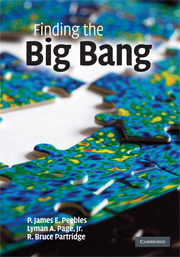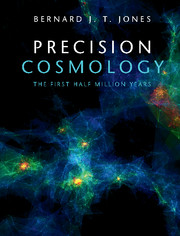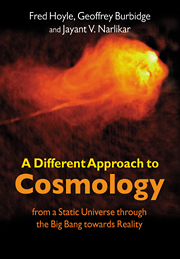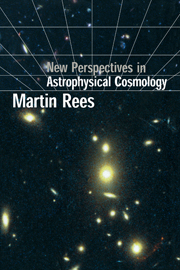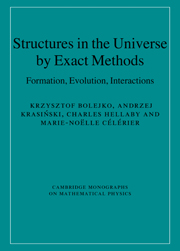Finding the Big Bang
$110.00 (C)
- Editors:
- P. James E. Peebles, Princeton University, New Jersey
- Lyman A. Page, Jr., Princeton University, New Jersey
- R. Bruce Partridge, Haverford College, Pennsylvania
- Date Published: April 2009
- availability: Available
- format: Hardback
- isbn: 9780521519823
$
110.00
(C)
Hardback
Other available formats:
eBook
Looking for an examination copy?
This title is not currently available for examination. However, if you are interested in the title for your course we can consider offering an examination copy. To register your interest please contact [email protected] providing details of the course you are teaching.
-
Cosmology, the study of the universe as a whole, has become a precise physical science, the foundation of which is our understanding of the cosmic microwave background radiation (CMBR) left from the big bang. The story of the discovery and exploration of the CMBR in the 1960s is recalled for the first time in this collection of 44 essays by eminent scientists who pioneered the work. Two introductory chapters put the essays in context, explaining the general ideas behind the expanding universe and fossil remnants from the early stages of the expanding universe. The last chapter describes how the confusion of ideas and measurements in the 1960s grew into the present tight network of tests that demonstrate the accuracy of the big bang theory. This book is valuable to anyone interested in how science is done, and what it has taught us about the large-scale nature of the physical universe.
Read more- Gathered together for the first time, 44 essays by eminent cosmologists on research on CMBR in the 1960s
- Two introductory chapters put the essays in context, explaining the ideas behind the expanding universe
- An important resource for anyone interested the large-scale nature of the physical universe
Reviews & endorsements
"A thrilling page-turner, Finding the Big Bang is the adventure story of one of modern science’s great discoveries, the cosmic microwave background radiation from the early universe. …[The book] will be of interest to anyone who wants to know how scientific discoveries are really made. For me, reading the essays was like studying my family tree, and it was endlessly fascinating. For all of us, the answers to key questions in this area of cosmology—for example, How did we get here? Where are we going?--can now be discovered in this fine book." - John C. Mather, Physics Today
See more reviews"Among the essays I found to be particularly interesting are those dealing with the situation in the Soviet Union. The rich essays of Rashid Sunyaev and Malcolm Longair provide remarkable insight into the hard conditions of physics and astronomy during the Communist era. Two other contributions that deserve to be singled out are those of Peebles and Partridge, who offer fascinating details about their pioneering work in Princeton in the 1960s. Although the book clearly celebrates the CMBR as a fossil of the big bang, it also includes a few critical voices, among them the seasoned critics Geoffrey Burbidge and Jayant Narlikar who favor a very different and more mundane explanation of the CMBR. Many of the essays are concerned with measurements and observational techniques rather than theory. One gets from the book a vivid impression of how important engineering competences are in modern cosmology." - Helge Kragh, Journal for the History of Astronomy
"...a new benchmark. ... Highly recommended." - CHOICE
Customer reviews
Not yet reviewed
Be the first to review
Review was not posted due to profanity
×Product details
- Date Published: April 2009
- format: Hardback
- isbn: 9780521519823
- length: 596 pages
- dimensions: 253 x 180 x 31 mm
- weight: 1.3kg
- contains: 33 b/w illus.
- availability: Available
Table of Contents
1. Introduction
2. A guide to modern cosmology
3. Origins of the cosmology of the 1960s
4. Recollections of the 1960s Dave Hogg, Neville Woolf, George B. Field, Patrick Thaddeus, Donald E. Osterbrock, Yuri Nikolaevich Smirnov, Igor Dmitriyevich Novikov, Andrei Georgievich Doroshkevich, Rashid Alievich Sunyaev, Malcolm S. Longair, Arno Penzias, Robert W. Wilson, Bernard F. Burke, Kenneth C. Turner, P. James E. Peebles, David T. Wilkinson, Peter G. Roll, R. Bruce Partridge, Malcolm S. Longair, John Faulkner, Robert V. Wagoner, Martin Rees, Geoffrey R. Burbidge, Jayant V. Narlikar, David Layzer, Michele Kaufman, Jasper V. Wall, John Shakeshaft, William Welch, Kazimir S. Stankevich, Paul Boynton, Robert A. Stokes, Martin Harwit, Judith L. Pipher, Kandiah Shivanandan, Rainer Weiss, Jer-tsang Yu, Rainer K. Sachs, Arthur M. Wolfe, Joe Silk, George F. R. Ellis, Ronald N. Bracewell, Edward K. Conklin, Stephen Boughn, Karl C. Davis, Paul S. Henry
5. Cosmology and the CMBR since the 1960s Dick Bond
Appendixes
Glossary
References
Index.
Sorry, this resource is locked
Please register or sign in to request access. If you are having problems accessing these resources please email [email protected]
Register Sign in» Proceed
You are now leaving the Cambridge University Press website. Your eBook purchase and download will be completed by our partner www.ebooks.com. Please see the permission section of the www.ebooks.com catalogue page for details of the print & copy limits on our eBooks.
Continue ×Are you sure you want to delete your account?
This cannot be undone.
Thank you for your feedback which will help us improve our service.
If you requested a response, we will make sure to get back to you shortly.
×
